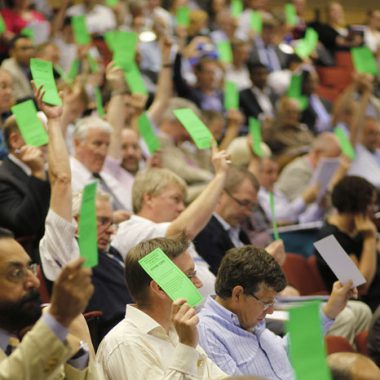Motion highlights from the UK LMC conference

Health screening
NORTH AND NORTH EAST LINCOLNSHIRE: That conference believes that health screening:
(i) should not take place within the UK’s national health services without the approval of the UK National Screening Committee
(ii) if carried out privately, requires the screening provider to provide follow up appointments with patients to discuss abnormal results, and if GPs end up doing this work for them, they are empowered to directly invoice the company for their time.
Sessionals
GP SESSIONALS subcommittee: That conference asks the GPC to recognise the plurality of roles taken up by GPs throughout the UK, which may include working regularly for a clinical commissioning group, regional health board or an alternative provider of general medical services, and demands that:
(i) their employment rights are negotiated in a similar way to the model salaried GP contract
(ii) GPs working in non-clinical roles should be represented by the GPC
(iii) GPC negotiates model terms and conditions for this disparate group of GPs.
GP trainees
GP TRAINEES subcommittee: That conference recognises GP training is outdated and needs radical overhaul. We call upon GPC to work with relevant stakeholders to:
(i) push for GP trainees to be predominantly based in general practice with set time to attend secondary care for learning opportunities
(ii) overhaul the e-portfolio requirements to ensure it is equitable across the UK
(iii) learn skills vital to modern GPs such as leadership, business, and management through funded courses
(iv) ensure all FY2s have a community placement.
NORTH YORKSHIRE: That conference recognises that good numbers of GPVTS trainers are critical to assisting with the GP recruitment/ retention crisis and instructs GPC to negotiate some national minimum standardisation regarding necessary qualifications for potential trainers so that:
(i) prior experience is transferable when a trainer moves location
(ii) potential new trainers are not put off by additional onerous requirements in certain geographical areas.
GP appraisal and revalidation
NOTTINGHAMSHIRE: That conference calls upon GPC UK to work with the GMC and respective NHS Bodies to overhaul GP appraisal and revalidation by:
(i) returning to a process that is formative rather than summative
(ii) taking opportunities to offer practical support and assistance to colleagues in distress
(iii) shifting emphasis from information gathering meetings to pastoral care and mentorship by appraisers
(iv) streamlining the process to a full appraisal every three years for those GPs who have had five consecutive ‘successful’ appraisals with annual probity statements continuing
(v) changing the revalidation cycle from five to six years.
Patient complaints
KENT: That conference demands that the performance regulatory processes dealing with patient complaints:
(i) anonymise doctors’ details to reduce any bias in the system
(ii) establish reducing risk to doctors as one of their main aims.
Immigration
TOWER HAMLETS: That conference notes that it is GPC policy that GPs should not do the work of the home office by checking immigration status of patients and:
(i) opposes the obligation on practices to send a copy of the GMS1 form to NHS Digital of patients who self-declare that they hold either a non-UK issued EHIC card, PRC or S1 form and opposes the obligation to manually record this information in the patient’s medical record
(ii) calls on GPC to support practices who wish to cross out the supplementary questions (Patient Declaration for all patients who are not ordinarily resident in the UK) on the GMS1 Form
(iii) instructs GPC to insist that the supplementary questions are removed during the next round of contract negotiations
(iv) instructs GPC to insist that the obligation on practices to send information regarding patient’s residency status to NHS Digital is removed during the next round of contract negotiations.
Payments
MID MERSEY: That conference demands that payments in any GP contract should:
(i) reflect numbers of patient contacts undertaken as well as list size
(ii) ensure that practices receive payment for registered patients who die before the end of a quarter
Primary care networks
LEICESTER, LEICESTERSHIRE AND RUTLAND: That conference believes that the development of primary care networks:
(i) will not improve general practice
(ii) will undermine the autonomy of general practitioners
IT
HULL AND EAST YORKSHIRE: That conference is concerned about the emergence of various IT solutions that are non-evidence based, untested and poorly regulated and:
(i) believes that this is having a negative effect on patient care
(ii) believes that IT solutions should be tested and approved at least in line with other medical and surgical interventions
(iii) believes that the IT developers should be held responsible legally and financially if these result in adverse outcomes for patients.
(iv) demands that GPC support general practices in refusing to implement IT-based medical algorithms; unless and until acceptable regulation and liability agreements are in place
Urgent care services
BEDFORDSHIRE: That conference, with regard to the commissioning of urgent care services:
(i) calls for urgent action by governments to address the problems of ambulance delays which are detrimental to patient care
(ii) believes that GP out of hours services should remain defined as primary medical services and not be separated into a collection of sub-specialist services under the title of ‘urgent care’
(iii) calls for a full evaluation of NHS 111 and equivalent services that continues to mis-direct patients and overload already stretched NHS services.
Source: BMA









